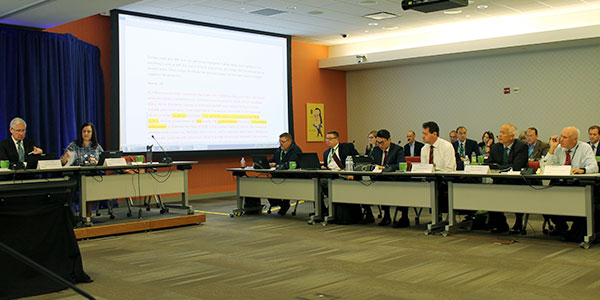VALLEY FORGE, Pa. — The PJM Markets and Reliability and Members committees on Thursday approved Operating Agreement revisions that would eliminate the requirement that the RTO liquidate a member’s financial transmission rights when it falls into default.
The proposed changes are in response to the June default of GreenHat Energy, which could cost other members more than $145 million. (See Doubling Down — with Other People’s Money.)
PJM presented stakeholders with four packages of revisions at the MRC. Two of those had received a majority sector-weighted vote out of 24 proposals at a special committee session Sept. 18. Option B, Thursday’s winner, received 3.8 out of 5 in support, while Option J1 — which would have liquidated all of a defaulting member’s long-term positions except those remaining in the 2018/19 planning year, allowing them to go to settlement — received 3.3.
After the special meeting, Macquarie Energy, with support from Apogee Energy Trading and Vitol, offered two more proposals: B’ and J1′ (read as “B prime” and “J1 prime”), identical to B and J1 except that they would only apply to GreenHat’s portfolio. Macquarie said these proposals would allow for continued discussion of PJM’s liquidation process after dealing with GreenHat.
All four proposals included two identical provisions. One would ensure that the maximum $10,000 default allocation assessment is charged only once for a default that spans multiple years, rather than each year.
The other would allow those who sold FTRs to the defaulting member in a bilateral trade to take them back if their most recent auction clearing prices were less than the purchase prices.
Brian Wilkie of Rockland Electric Co. moved for considering B without the bilateral provision, which Exelon’s Jason Barker seconded. This proposal was dubbed B” (“B double prime”).
Dean Bickerstaff of Hartree Partners moved, with CPower’s Bruce Campbell seconding, that the MRC also consider Option K1B, which had only received 1.99 in support at the special meeting. K1B would have also allowed the 2018/19 positions to go to settlement, but it would have canceled all defaulting long-term FTRs. It also would have forced counterparties to the defaulters’ bilateral trades to reassume those positions.
Only B received the 3.34 sector-weighted supermajority support necessary to move on to the MC, with 3.73 in favor. B” received 1.88, B’ and J1 each received 1.8, J1′ got 1.44 and K1B 0.44.
At the MC later Thursday, Bob O’Connell of Panda Power Funds moved that the committee vote to accept the MRC’s vote as its own, but he withdrew the motion when DC Energy’s Bruce Bleweis called for a sector-weighted vote on it. Committee Chair Michael Borgatti, of Gabel Associates, called for a sector-weighted vote on B anyway, and the proposal passed with 4.01 in favor.
CFO Suzanne Daugherty explained that PJM will submit B as three separate “prongs” to FERC, with the $10,000 maximum and bilateral provisions in their own filings. Daugherty said this was done so that if the commission ends up rejecting one provision, it would not be forced to reject the entire package.
Members also reaffirmed their opposition to the status quo, with only 0.5 in support. If FERC rejects the proposal to eliminate the liquidation requirement, the RTO will ask in an amendment to a pending filing that the commission allow all of GreenHat’s positions to go to settlement until the end of February to allow for additional stakeholder discussion of alternatives to the status quo. PJM has asked the commission to allow the positions to go to settlement through Nov. 30, but FERC has not acted on the filing, nor on the RTO’s waiver request seeking permission to only liquidate prompt month FTRs.




